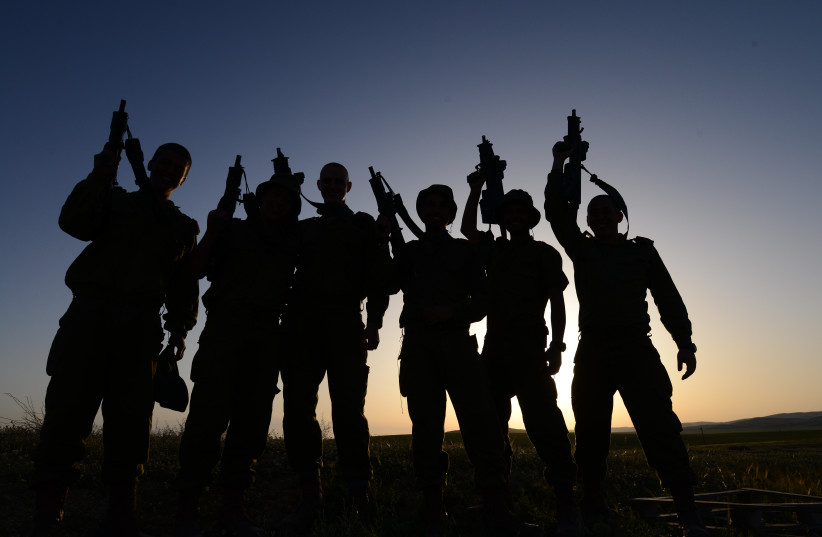The 2021 Democracy Index compiled by the Viterbi Family Center for Public Opinion and Policy Research at the Israel Democracy Institute (IDI) was recently published. The index is based on a survey of a representative sample of Israel’s adult population and includes measures of public trust in various state institutions. Continuing a trend revealed in last year’s index, public trust in its institutions has significantly eroded. As was also the case last year, the IDF has not remained immune to this trend; while it has maintained its place at the top of the trust rankings, its rating has slipped even further below the 80% mark, even when we only examine the data for Jewish respondents.
Delving more deeply into the data reveals a particularly troubling finding: Trust is especially low among the younger generation – those who are expected to fill the IDF’s ranks in the future. The IDF chief of staff no doubt had this in mind when he reminded the audience in a recent speech that what’s needed to win battles are battlefield combat soldiers, not just skilled cyberwarfare personnel.
The data on public trust reveals that while the public continues to have great confidence in the military’s operational capabilities, it is more skeptical with regard to social, economic, and ethical issues related to the IDF – in other words, everything relating to the traditional interface between the IDF and Israeli society. This differentiation is not exactly news: Not only has it been identified in IDI’s surveys before, but the IDF’s own internal surveys have produced similar findings.
Until now, the IDF did not appear to be unduly troubled by this finding. After all, as every citizen knows, the military’s job is to win wars, achieve its operational goals and maintain security. No one in Israel would argue that this is not the IDF’s main purpose and in this regard, it enjoys wall-to-wall support. IDF values and decent transportation to and from bases are all very well, but staying alive comes first. The public, the IDF would claim, understands this well.
It took some time for the IDF senior command to understand that herein lies the problem. If the findings were reversed, and the public was satisfied with the military’s functioning with regard to values, service conditions, and so on, but mistrusted its operational capabilities, then – while this would be a troubling scenario – it would be easier to fix. On the other hand, a crisis of trust regarding values is a different story. Just think about how we relate to people: Professional mistakes might be difficult to accept and may have serious consequences, but ethical mistakes are much harder for us to accept and deal a more severe blow to trust in the wrongdoer.

It is important to clarify that this does not imply that the IDF should fall into line with the opinions on values expressed by the public at large. The data show that when the military stands up for itself on ethical issues in the face of public sentiment (as in the Elor Azaria case, for example) it does not damage public trust. What the public is essentially saying is not that the IDF’s ethical stance is unacceptable, but that it suspects that when the IDF makes decisions on ethical and social issues they are not based on the right considerations, whether because the military does not attach sufficient importance to the individual well-being of its soldiers (for example, regarding food or transportation), it looks out for senior officers’ welfare at the expense of the public (such as via additional pension payments) or it applies improper considerations (vis-a-vis gender equality, for example). Above all, the public is telling the IDF, “the trust we place in you regarding operational aspects does not excuse the way you handle other issues.” This year’s trust rating – the lowest since these measurements began – is proof of this.
It should also be noted that when the IDF responds to public criticism with an us-versus-them narrative (we are complaining about pension payments, while they are busy with keeping them safe), it only drives a larger wedge and further lowers public trust. This is not to say that the IDF should bow its head with regard to every argument leveled at the military, but rather that it should be careful not to intensify divisiveness.
Recently, it would seem that this message has hit home. Even if the increase to soldiers’ living stipends is suspected of being a populist ploy, other steps taken to provide better treatment of soldiers indicate that lessons have been learned and efforts are being made to institute necessary improvements. Hopefully, the announcement of the establishment of a team of high-ranking IDF officers focused on relations between the IDF and Israeli society heralds meaningful progress. In this context, it is worth considering bringing civilian representatives into the discussion. These developments mark an important crossroads in the relationship between the IDF and Israeli society, and as always, we must be sure to take the right path – one that will rebuild and restore trust.
The writer is director of the Military and Society Program at the Israel Democracy Institute.
